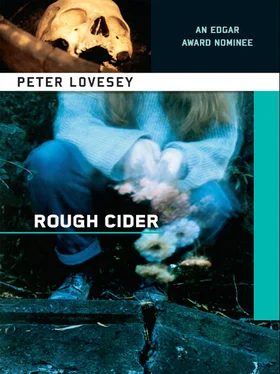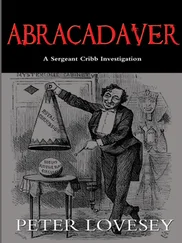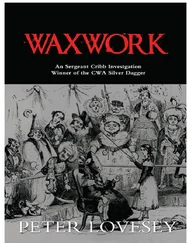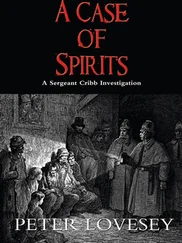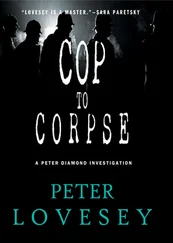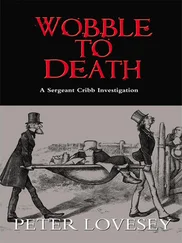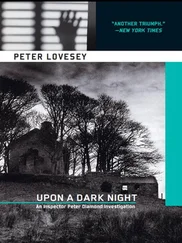Peter Lovesey - Rough Cider
Здесь есть возможность читать онлайн «Peter Lovesey - Rough Cider» весь текст электронной книги совершенно бесплатно (целиком полную версию без сокращений). В некоторых случаях можно слушать аудио, скачать через торрент в формате fb2 и присутствует краткое содержание. Жанр: Криминальный детектив, на английском языке. Описание произведения, (предисловие) а так же отзывы посетителей доступны на портале библиотеки ЛибКат.
- Название:Rough Cider
- Автор:
- Жанр:
- Год:неизвестен
- ISBN:нет данных
- Рейтинг книги:4 / 5. Голосов: 1
-
Избранное:Добавить в избранное
- Отзывы:
-
Ваша оценка:
- 80
- 1
- 2
- 3
- 4
- 5
Rough Cider: краткое содержание, описание и аннотация
Предлагаем к чтению аннотацию, описание, краткое содержание или предисловие (зависит от того, что написал сам автор книги «Rough Cider»). Если вы не нашли необходимую информацию о книге — напишите в комментариях, мы постараемся отыскать её.
Rough Cider — читать онлайн бесплатно полную книгу (весь текст) целиком
Ниже представлен текст книги, разбитый по страницам. Система сохранения места последней прочитанной страницы, позволяет с удобством читать онлайн бесплатно книгу «Rough Cider», без необходимости каждый раз заново искать на чём Вы остановились. Поставьте закладку, и сможете в любой момент перейти на страницу, на которой закончили чтение.
Интервал:
Закладка:
Then I saw Barbara coming from the same direction, closely followed by her father. Her hair was hanging loose, and she was carrying the scarf she’d used as a fastening. As she came closer I saw that she was crying. She broke into a run. Ignoring everyone, including her mother, who stepped towards her asking, “Barbara, my love, what is it?” she ran through the gate towards the house.
Mr. Lockwood spoke briefly to his wife, and they followed Barbara.
At this point you’ll be wanting to know precisely what had happened. I can tell you that Alice broke into my narrative and asked if it was a sexual attack.
I reminded her that I was just a child. If there was gossip, as I’m sure there must have been, they didn’t let me in on it. All I know for certain is that Cliff Morton didn’t appear again for the apple picking, and nobody would mention the incident in my presence in the house. I saw marks on Barbara’s throat that I now know to be love bites, and I heard her mother’s low voice through the wall, questioning her by the hour in her bedroom that night, but the words were inaudible.
Alice wasn’t satisfied. She didn’t seem able to accept that at nine years old I was clueless about sex. She kept insisting that I must have heard something, if not from the family, then from the village girls. If I did, it didn’t make sense to me at the time, and I haven’t retained it. I’ve told you the facts I remember.
Alice folded her arms and said, “I don’t believe this!”
“All right,” I told her evenly. “I’ll save my breath.”
SIX
She blinked rapidly two or three times, and her mouth trembled as if she were about to cry. She said huskily, “For pity’s sake, Theo, don’t clam up on me now.”
I told her, “Leave it, then. I can tell you what I remember and that’s all.”
“But you must have thought about it since.”
“Often.”
“In that case…”
“My thoughts won’t help you. Let’s stay with my memories. Christ, we’ll be here all night if we get into speculation.”
Alice lowered her head and drew her arms tightly across her chest. “I’ve got to live with this tragedy for the rest of my life.”
The self-pity didn’t move me. I said sharply, “I was part of it. How do you think I feel, forced to go over it again?”
“Sorry.” She straightened up and moved her hand across the table in a placating gesture. “I won’t interrupt again, Theo. I promise.”
I took up the story.
The stacks in the orchard multiplied during that last week of September 1943, and diffused sweet-sharp aromas through the crisp air. I joined the pickers at every opportunity, reluctantly fitting school and sleep into the intervals. While I was working, the homesickness hardly troubled me at all.
One evening after tea the GIs unexpectedly drove in to spend a few more hours with us. I was elated, especially as Duke had brought some chewing gum for me to hand round at school. The Yanks generally were known for their generosity to children, but to me it was more personal. Duke understood how I felt as an outsider. In between gathering the apples he asked me how I was treated there. I told him they were no different, really, from the kids I knew in London, except for the way they talked. He chuckled at some of the names I’d heard for ailments that kept them off school, like hoppy cough, brown kitties, and information. One boy had spent a week in horse piddle. Duke said he was collecting local words and sayings, and he asked me to listen out for more, not just at school but round the farm. No doubt he saw a small, lonely boy in need of distraction, although I know his interest in the dialect was genuine.
I’ve a suspicion that Mr. Lockwood overheard some of this, because as the light faded, he came out with a beauty, which I hope I remember right: “Well, ‘tis dimmit near as dammit. Us be to home, I say.”
Walking back with Duke and Mr. Lockwood, I heard Duke ask after Barbara, who hadn’t put in an appearance that evening. Mr. Lockwood gave a sniff and said, “Seen too many apples, I reckon.”
“But she’s okay, sir?”
“Right as rain.”
Duke cleared his throat and said, “Some of the guys at the base are putting on a show for Columbus Day a week Saturday. Amateur talent, mostly, but not bad, not bad at all. Harry and I figured maybe Barbara and her friend Sally…”
Mr. Lockwood said as if the connection were obvious, “Can ‘ee get hold of a gun?”
Duke frowned. “I guess I could, sir.”
“Can ‘ee use ‘un?”
“Sure.”
“Come over betimes. Shoot some of they pigeons for supper, talk some sense into my maid Barbara.”
So a shooting party was got up the following Sunday. Four men with three weapons between them. Mr. Lockwood and his son, Bernard, had shotguns, while Duke and Harry shared a service-issue automatic pistol, a Colt.45. No questions were asked about where it came from. Acquiring it was easy, I imagine, compared with smuggling a jeep out of the base, and that seemed to raise no problems.
Being so young, I wasn’t invited. I recall sitting in the farmhouse kitchen hearing shots from the woods and feeling sorry for the pigeons; needlessly, as it turned out. The shooting party shot nothing, and we supped on bacon and eggs. But the evening wasn’t wasted for Duke, because Barbara agreed to attend the Columbus Day show if her friend Sally went too.
The day also ended happily for me. Duke promised to come back and show me how the Colt.45 worked. I might even be allowed to try a few shots myself. He was leaving the pistol in the drawer of the hallstand where the shotguns were kept, because there’d be another shooting party before long.
In bed that night I credited myself with bringing Duke and Barbara together. Two of the kindest people in the world; perfectly matched by me. They’d never have met if I hadn’t brought Duke to the farm. I still reflect on it sometimes. The difference is that these days it doesn’t send me into a deep, smug sleep. It has me racked with guilt.
On the night of the show Barbara brought me back a Hershey bar from the base. It was after midnight when she tiptoed past the open door of my room. I called out to her. She came in and sat on my bed and described every turn in the show, from a black jazz man to a man who took off Hitler. And she’d had the surprise of her life when Duke had gone up on the stage. He hadn’t been on the program. He was just called up there to fill in with a song when there was some backstage hitch. There’d been a great cheer from the GIs as he went forward. They’d handed him a guitar and he’d sat on the edge of the stage in front of the curtains and sung three or four songs. He’d got a really fine voice and a great sense of rhythm and he’d written all the songs himself. The audience had loved it. And Barbara had felt fit to burst with pride when he’d taken his applause and come back to his place beside her in the audience.
She told me she’d be meeting Duke again. There was more to him than she’d thought at first, quite apart from his musical talent. Beautiful manners and a quiet, roguish sense of humor. Withal, he was shy, which she’d never have expected a Yank to be.
After that I looked forward to his calling often at the farm, but Barbara preferred to meet him secretly. Possibly she didn’t want her parents to know how often she was seeing him, because there was a lot of local gossip about GIs behaving badly with girls. She used to say she was meeting Sally. I think Duke would meet her down the lane and drive her into Glastonbury or Shepton Mallet for a drink. She was always home before eleven. And I always left the door of my room ajar, in case she wanted to come in and talk.
Once, when I was cleaning my shoes outside the kitchen door, Mrs. Lockwood came out and talked to me about Barbara. There’d been some friction in the family since the incident in the orchard with Cliff Morton. I think they blamed Barbara at least in part for what had happened. Mrs. Lock-wood asked me if any of the village children had mentioned seeing Barbara going out with Americans. I was truthfully able to say they hadn’t. The kids at school didn’t ever speak about Barbara. Then Mrs. Lockwood asked me flatly if Barbara was seeing Duke.
Читать дальшеИнтервал:
Закладка:
Похожие книги на «Rough Cider»
Представляем Вашему вниманию похожие книги на «Rough Cider» списком для выбора. Мы отобрали схожую по названию и смыслу литературу в надежде предоставить читателям больше вариантов отыскать новые, интересные, ещё непрочитанные произведения.
Обсуждение, отзывы о книге «Rough Cider» и просто собственные мнения читателей. Оставьте ваши комментарии, напишите, что Вы думаете о произведении, его смысле или главных героях. Укажите что конкретно понравилось, а что нет, и почему Вы так считаете.
